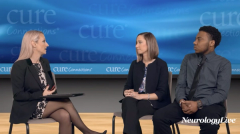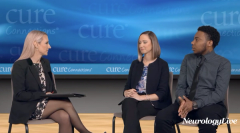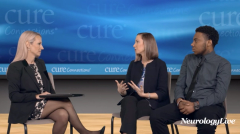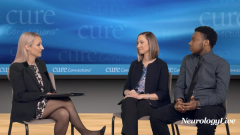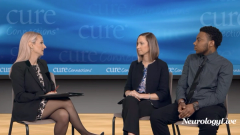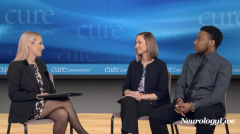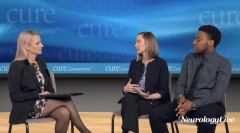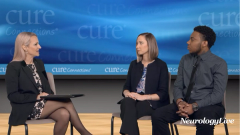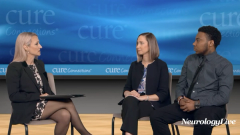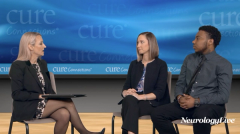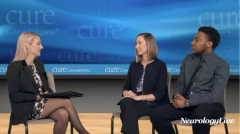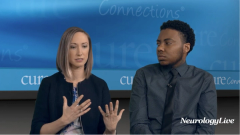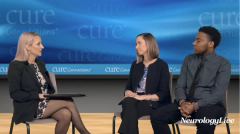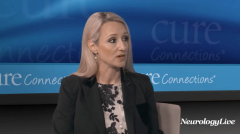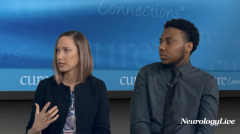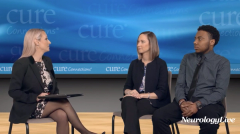
Family Planning for People With SMA
Episodes in this series

Philippa Cheetham, MBChB, MRCS, MD, FRCS: Do you see the potential red flags in terms of decade of life, that as Sebastian gets older, you may have other concerns of the effect of the diagnosis on medical issues that he may have in the future?
Crystal Proud, MD: We don't necessarily see that this impacts other organ systems in a different way than it would in somebody who is typically developing. It is incredibly important to make sure that our younger patients who will be surviving into their 60s, 70s, and 80s, continue to seek routine medical care that's appropriate. That can be very difficult. It can be hard for some of our patients to be able to get onto an examination table to perform things that are recommended, like a colonoscopy, or women getting their yearly examinations. And so I really try to reinforce to my patients that as uncomfortable as it may be, you need to keep up with the routine standards of care because my hope and expectation is that you will live a very long and fruitful and healthy life.
Philippa Cheetham, MBChB, MRCS, MD, FRCS: Sebastian is now 22. Do you have questions about how to screen your own children in the future and what tasks need to be done? How do you broach those subjects when you have a patient with SMA [spinal muscular atrophy] who is asking about their own family?
Crystal Proud, MD: We just talked about this in clinic.
Sebastian Mills: I'm actually 23, but it's fine, they won't check my ID as much. But we did actually just talk about this. We talked about how, whoever I decide to be a partner with, they'll be able to do the scanning there as well, and to see the potential of the child having a baby as well. There's also research, I believe that you said that they could see which eggs would actually have the SMA gene and the ones that don't have the SMA gene. There are a lot of things in science now that are becoming very beneficial to people with SMA to try to move forward and have those families and be able to know how to take care of the child when the child comes into the world.
Philippa Cheetham, MBChB, MRCS, MD, FRCS: Would you be recommending genetic testing early on in this situation?
Crystal Proud, MD: The American College of Obstetricians and Gynecologists now recommends that individuals be tested for carrier status. We know that Sebastian is affected by spinal muscular atrophy. The next question is whether his partner would be impacted as well. And so, we would then test that partner to say whether they were a carrier. If that individual was a carrier, we would know that there would be a risk to the future offspring, that they may be impacted by the disease itself versus being carriers themselves.
And so, we would approach that very differently. We do have a genetic counselor I work with who is able to help us educate our individuals who are looking at family planning, or families who already have a child who was impacted by SMA and who might want more children in the future. And how do we go about that? There are options these days, which Sebastian was alluding to, with consideration of things like in vitro fertilization with preimplantation genetic diagnosis, called PGD, that can identify embryos impacted by SMA and those that are not. So we have a whole world of things that need to be discussed when we're talking about family options.
Philippa Cheetham, MBChB, MRCS, MD, FRCS: Sebastian, we've heard that you have a phenomenal medical team around you, and you’ve had access to novel therapies, where it's actually very proactive that you got this infusion up front, where Dr Proud reached out to you at college. Who else has helped you on your journey, other than the medical profession?
Sebastian Mills: My parents. They're awesome. They're very supportive. Especially my mom, she pushed me into it. She guilted me into doing it. I'm glad she did because if not, I probably would have been, like I mentioned earlier, worse off and still having trouble picking myself up off of the floor. I do still need assistance here and there, but I'm getting a lot stronger each day and especially when I get my infusions, they're helping a lot, so I'm grateful.
Philippa Cheetham, MBChB, MRCS, MD, FRCS: When you're with peers at college and friends, do they have an understanding of the effect of the disease, do you think, on your limitations? Or does it not really come up in conversation?
Sebastian Mills: They do. It's to the point where if somebody is staring at me, they’re defensive about it because they understand what's going on. Actually, I've educated the people around me enough to where they can educate somebody else because sometimes there's a side conversation when people are uncomfortable to come to the person. So I've educated the people around me enough for them to be able to explain to somebody else, that it’s okay they’ve never heard of it. It's always good to get the information out there to everybody, even people who may not have heard of it or even know what it is.
Newsletter
Keep your finger on the pulse of neurology—subscribe to NeurologyLive for expert interviews, new data, and breakthrough treatment updates.

